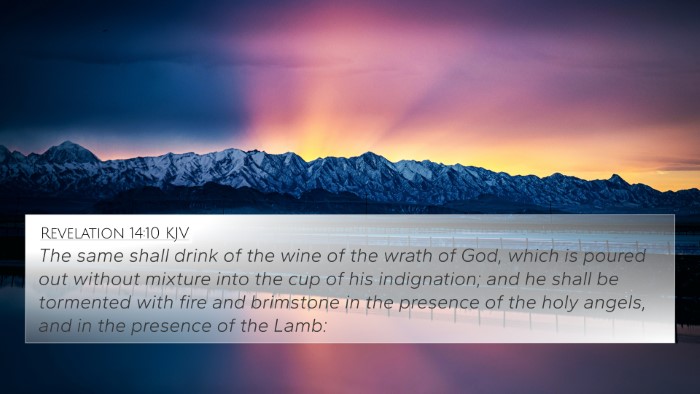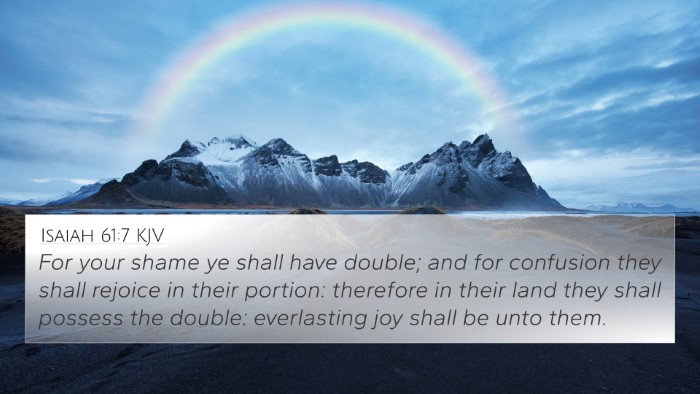Understanding Revelation 18:6
Revelation 18:6 states: "Render to her just as she rendered to you, and repay her double according to her works; in the cup which she has mixed, mix double for her." This verse is part of the thematic climax in the description of Babylon's fall, emphasizing divine justice and retribution.
Commentary Insights
This verse captivates the reader with its profound implications about justice and consequences. Here, we'll explore insights from renowned public domain commentaries to deepen our understanding of this scripture.
Matthew Henry's Commentary
According to Matthew Henry, this verse underscores God's justice in dealing with the wicked. Babylon, representing the epitome of evil in the world, will reap what it has sown. Henry notes that the phrase "repay her double" signifies not only a complete measure of justice but an enhanced one that reflects the severity of Babylon's sins against God's people.
Albert Barnes' Notes
Albert Barnes highlights that the command to render double indicates the overwhelming weight of God's judgment upon Babylon. It describes the method of divine repayment, suggesting a twofold consequence for the idolatrous practices and the persecution faced by the saints. Barnes emphasizes that God's judgments are fair and proportional, aligning with the broader biblical principle of divine retribution.
Adam Clarke's Commentary
Adam Clarke adds that the "cup" refers to the suffering and calamities Babylon poured out during its reign. When the verse mentions mixing "double for her," it illustrates the notion of experiencing what one has inflicted upon others. Clarke connects this to the principle found in numerous scriptures that call for accountability and justice, affirming that God will not overlook the sins of the oppressors.
Thematic Connections and Cross-References
Revelation 18:6 provides deep theological implications, establishing connections throughout Scripture. Below are some significant Bible cross-references that are related to this verse:
- Jeremiah 50:29 - This verse similarly discusses the justice of God against Babylon, emphasizing how Babylon will be repaid for its actions.
- Isaiah 47:7-9 - A warning to Babylon about their arrogance and the inevitable divine judgment they will face for their actions.
- Matthew 7:2 - "For with what judgment you judge, you will be judged; and with the measure you use, it will be measured back to you." This echoes the theme of retributive justice present in Revelation 18:6.
- Galatians 6:7 - "Do not be deceived, God is not mocked; for whatever a man sows, that he will also reap." This foundational principle of divine justice resonates with the message in Revelation.
- Romans 12:19 - This verse declares, "Vengeance is Mine, I will repay," which connects to the idea of God's judgment and the importance of trusting Him for justice.
- 2 Timothy 4:14 - Paul speaks of Alexander the coppersmith, who did him much harm, stating that the Lord will repay him, aligning with the theme of divine repayment.
- Matthew 18:35 - This verse indicates that our forgiveness and treatment of others may influence the judgment we face, linking to the notion of accountability established in Revelation 18:6.
Conclusion: The Broader Context of Revelation 18:6
Understanding Revelation 18:6 within the broader narrative of the Book of Revelation and the entire Bible provides a powerful message about God’s justice. It serves as a potent reminder that God's judgment is righteous, and oppressors will face the consequences of their actions.
As you study this verse, consider the following:
- Reflect on the nature of God's justice and how it is portrayed in various scriptures.
- Examine how the themes of accountability and divine repayment manifest throughout the Bible.
- Utilize tools for Bible cross-referencing to explore the interconnected themes between this and other verses, enhancing your understanding.
- Engage in cross-reference Bible study methods to deepen your insight into the principles of justice as understood in both the Old and New Testaments.




















